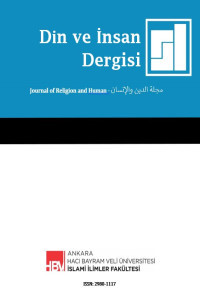ÖZGÜR İRADE VE AHLAKİ SORUMLULUK TARTIŞMASINA BAĞDAŞMAZ BİR YAKLAŞIM
Bu makalede özgür irade ve ahlaki sorumluluk ilişkisi bağdaşmazcı anlayış çerçevesinde tartışılacaktır. Özellikle bu tartışmanın çağdaş eylem felsefesi içinde hatırı sayılır bir yeri vardır. Genel olarak çağdaş eylem felsefesinde özgür irade ve ahlaki sorumluluk tartışması determinizm ile birlikte açıklanmaktadır. Determinist bir dünyada özgür iradenin varlığından nasıl söz edebileceğimiz, bağdaşırcılık, bağdaşmazcılık ve özgürlükçülük çerçevesinde ele alınmaktadır. Bağdaşmazcılık özgür irade ve ahlaki sorumluluğun, determinizm ile bağdaşmaz olduğu iddiasıdır. Bağdaşmazcılığa göre özgür irademiz olduğuna inanırız. Bağdaşmazcıların çoğu bunun bile tek başına hem özgür iradenin hem de ahlaki sorumluluğun varlığına inanmamız için yeterli olduğunu düşünür. Bu makalenin amacı söz konusu tartışmayı, bağdaşmazcılık bağlamında incelemektir. Bu makaledeki temel iddia, bağdaşmazcılığın determinizm konusundaki düşünceleri akla yatkınken özgür irade ve ahlaki sorumluluk konusundaki düşüncelerinin eksik ve yetersiz kaldığıdır.
Anahtar Kelimeler:
özgür irade, ahlaki sorumluluk, determinizm, bağdaşmazcılık
AN INCOMPATIBLE VIEW ON THE DEBATE OF FREE WILL AND MORAL RESPONSIBILITY
In this article, we will explore the relationship between free will and moral responsibility based on the incompatibilism. This debate holds significant importance in comtemporary analytical action philosophy. Typically, discussions surrounding free will and moral responsibility are linked with determinism in contemporary philosophy of action. Within the framework of compatibilism, incompatibilism and libertarianism, we discuss how we can acknowledge the existence of free will in a deterministic world. Incompabilism is the belief that determinism is incompatible with free will and moral responsibility. According to incompatibilism to believe we possess free will. Many of incompatibilist think that is sufficient for ust to believe in the existence of both free will and moral responsibility. This study aims to examine the context of this debate framework incompatibilism. The main claim of this article is that, while incompatibilism's ideas on determinism are plausible, its ideas on free will and moral responsibility are incomplete and inadequate.
Keywords:
free will, moral responsibility, determinism, incompatibilism,
___
- Bok, H. (1998). Freedom and responsibility. Princeton: Princeton University Press.
- Borchert, D. M. (2006). Encyclopedia of philosophy. USA: 2nd edition, c. 3.
- Campbell, J. K. (2007). Free will and the necessity of the past. Analysis, vol. 67, no. 2, 105-111.
- Capes, J.& Swenson, P. (2021, 18 Ağustos). Incompatibilist (Nondeterministic) Theories of Free Will. Stanford Encyclopedia of Philosophy. https://plato.stanford.edu/entries/incompatibilism-theories/
- Demir, M. (2022). Daniel Dennett ve özgür irade. (Yayımlanmamış yüksek lisans tezi). Fırat Üniversitesi Sosyal Bilimler Enstitüsü.
- Doğan, M. (2021). Yapay zekâ ve özgür irade: yapay özgür iradenin imkânı. Trt Akademi. c:6, s:13, 788-811.
- Doyle, B. (2016). Free will: the scandal in philosophy. USA: Cataloging in Publication Data.
- Fischer, J. M.& Ravizza, M. (1993). Perspectives on moral responsibility. Ithaca: Cornell University Press.
- Fischer, J. M.& Ravizza, M. (1998). Responsibility and control: a theory of moral responsibility. Cambridge University Press.
- Fischer, J. M. (2007). Compatibilism. Four views on free will içinde ed. J. M. Fischer, Robert Kane, Derk Pereboom vd. USA: Blackwell Publishing, 2007.
- Franklin, C. E. (2016). If anyone should be an agent-causalist, then everyone should be an agent-causalist. Mind, vol. 125, no. 500.
- Gündoğdu, H. (2007). Corliss Lamont’ta ‘seçme özgürlüğü ve belirlenimcilik’ problemi. Kaygı Uludağ Üniversitesi, Fen-Edebiyat Fakültesi Felsefe Dergisi, 128-152.
- James, W. (1907). The will to believe and other essays in popular philosophy. London: Longmans Green and Co. Press.
- Kane, R. (1996). The significance of free will. Oxford: Oxford University Press.
- Kane, R. (2000). Responses to Bernard Berofsky, John Martin Fischer and Galen Strawson.” Philosophy and Phenomenological Research, vol. 60, no. 1, 157-167.
- Kane, R. (2005). A contemporary introduction to free will. NY: Oxford University Press.
- Kane, R. (2007). Libertarianism. Four views on free will içinde, ed. John Martin Fischer, Robert Kane, Derk Pereboom, Michael Vargas, USA: Blackwell Publishing, 2007.
- Kane, R. (2011). The Oxford handbook of free will. Oxford: The Oxford University Press.
- Markosian, N. (1999). A compatibilist version of the theory of agent causation. Pacific Philosophical Quarterly, vol. 80, no. 3, 257-277.
- Mele, A. R. (1995). Autonomous agents: from self-control to autonomy. Oxford: Oxford University Press.
- Nagel, T. (1979). Moral questions. England: Cambridge University Press.
- Onur, F. (2020). İrademiz özgür değil: metafizik bir problem olarak özgür irade. Metazihin Yapay Zeka ve Zihin Felsefesi Dergisi, c:3, s:1.
- Pereboom, D. (1995). Determinism al dente. Blackwell Publishing, Noûs, vol. 29, no. 1, 21-45.
- Pereboom, D. (2001). Living without free will. Cambridge: Cambridge University Press.
- Pink, T. (2004). Free will: a very short introduction, NY: Oxford University Press.
- Robb, D. (2020, 9 Temmuz). Moral Responsibility and the Principle of Alternative Possibilities. Stanford Encyclopedia of Philosophy. https://plato.stanford.edu/entries/alternative-possibilities/
- Sartorio, C. (2016). Causation and free will. UK: Oxford University Press.
- Speak, D. (2011). The consequence argument revisited. The Oxford handbook of free will içinde, ed. Robert Kane. Oxford: The Oxford University Press.
- Strawson, G. (1986). Freedom and belief. NY: Oxford
- Başlangıç: 2021
- Yayıncı: Ankara Hacı Bayram Veli Üniversitesi
Sayıdaki Diğer Makaleler
SANAL ALEMİN GELECEĞİNDE İNSAN VE POSTMODERN GÖRÜNÜMLER: METAVERSE'DE KİMLİK
İBN ATÂULLAH EL-İSKENDERÎ’NİN EL-ḤİKEMÜ’L-ʿATÂʾİYYE ESERİNDEKİ İNSAN TASAVVURU
RELIGION, SPIRITUALITY, MENTAL HEALTH AND WELLBEING; A REVIEW
DİYANET İŞLERİ BAŞKANLIĞI DİNİ YÜKSEK İHTİSAS EĞİTİMİ
ÖZGÜR İRADE VE AHLAKİ SORUMLULUK TARTIŞMASINA BAĞDAŞMAZ BİR YAKLAŞIM
HZ. PEYGAMBER DÖNEMİNDE BESLENME VE SAĞLIK İLİŞKİSİ
FARABİ VE SPİNOZA’DA BİLGİNİN BELİRLENİMLERİ VE MUTLULUK
MATBUAT TARİHİMİZ VE KAMU YAYINCILIĞI ÜZERİNE ÖZLÜ BİR DEĞERLENDİRME
